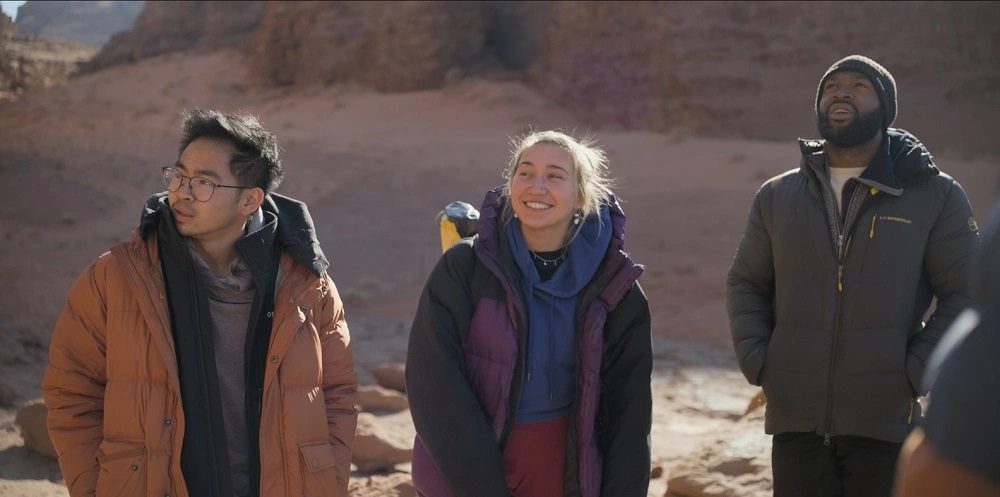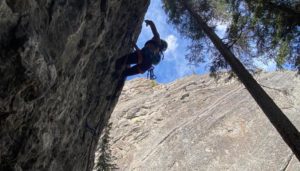Conversation with Cat Runner, Winner of HBO’s The Climb
"My trans identity is an additional point, not the focal point. They let me navigate and create a storyline about how much I revealed, and I had agency"

Cat Runner, of Louisville, Ky., is the winner of the reality TV series, The Climb, hosted by Chris Sharma and Jason Momoa, with its $100,000 grand prize and year-long PrAna, sponsorship worth $100,000. Gripped caught up with Cat for a conversation about climbing, the show and his plans for the near future.

How did your climbing journey lead to being on The Climb? I’ve been climbing for six years, mostly bouldering and sport climbing in the Red River Gorge and other spots in the southeast. I heard about the show from friends who were applying for it, saw the open casting call and decided to throw my hat in the ring. The worst that could happen was that I wouldn’t get picked, then have a climbing season in the Red. If I was chosen, it would be my first climbing trip outside of the south. I sent in a resume with my climbing ability on it, there were a few meetings with the director and producers, then HBO execs and Jason and Chris, finally, I got a phone call to get ready and fly to Majorca in a couple of days.
Did you have to learn any new climbing skills in anticipation of the show? Did you know which challenges were coming up? I did Bedtime for Bonzo, a 5.6 two pitch trad line in the Red, and a few trad lines, but we didn’t really know what the challenges would be. Would they make us work for our quickdraws or fix a road trip van?
The Climb begins to address your personal journey as an athlete in the third episode – why do you think it was important to let viewers get to know you before sharing your full story? I really liked the way they naturally introduced me. My trans identity is an additional point, not the focal point. They let me navigate and create a storyline about how much I revealed, and I had agency. Trans identity can become your whole identity to people. You can also run into people who don’t act the same towards you after you come out; their ignorance changes how they see you. I thought the show did it extremely well. It didn’t put the spotlight on trans climbers, but on how they interact with others.
Your win comes at a time when widespread anti-trans legislation in the US is being passed, including efforts to ban trans athletes from sports. Do you think your win will raise awareness on this issue? I hope, if anything, my win will give a larger platform to reach more people, changing opinions, maybe humanizing this issue. A lot of convos happening now dehumanize trans people and make it easier to bully. These are obviously very scary, since I’m a human! Anti trans laws in sports are mostly targeting trans women and girls. There are also trans laws targeting minors, and I transitioned as a minor. I don’t speak for the entire trans community though. Limited exposure turns you into spokesperson, but mine is only a single experience.
Climbing is known to attract outsiders – do you think this has made it a more welcoming sport for the LGBTQ+ community? I think so, with the rise and modernized commercial climbing gyms tend to be in urban larger cities where the acceptance is higher than in rural areas. Acceptance reflects where someone enters climbing. Racism, sexism, transphobia and so on can happen in climbing gyms. They’re a microcosm of the local human community. There’s more awareness of diversity, but some places we climb can still be very scary.
Is there anything special that happened that didn’t go into the final cut of the show? I have unforgettable memories on and off camera. The best way to imagine it is like a really intense climbing trip with best friends. Shenanigans happen. We all enjoyed it and had a great time. It was such a respectful group. I had no idea what it was going to be like; would there be psychological warfare, sabotage? It was a relief when it turned out to be good people here to do their best and adapt to the situation.
Tell us about the Queer Climbers Network. It’s an Instagram channel now, but it’s going to serve as a one-stop database to find a lot of info about climbing. I want it to exist as a place where you can find meetups, grants, scholarships, build community. It’s hard to find help unless you know where to look, following or knowing exact Instagram channels. I wanted to help connect queer climbers and make it a bit less intimidating. Climbing has absolutely revolutionized my life because of the support and people. It can push you to become your fullest self. You have to be vulnerable enough to find a really solid group to catch you. Everyone should have that. Right now, the Queer Climbers network is an Instagram channel, but the website will be online soon.
Future plans? I love my job. But I’m still figuring things out. I have some big plans. In March I’m speaking at the No Man’s Land Film Festival in Denver, then I’ll shoot the Flash Foxy Festival in Bishop. I have other engagements in Salt Lake City and Vegas, and a big climbing trip to South Africa. As long as I’m with really good people, I could climb anywhere.


